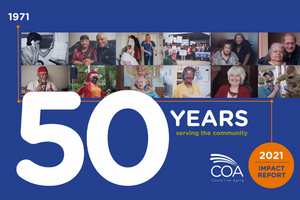
Below are the full stories from the 2021 Highlights section of the 2021 Impact Report. Click the links below to jump directly to the article you wish to read.
- COA moves headquarters in 2021
- Suzanne Burke recognized as top CEO in the region
- COA receives community champion award for vaccinating homebound older adults
- COA’s pandemic comfort meal program receives disaster preparedness innovation award
- Comfort Meal program grows, wins award during year two of pandemic
- Forum on Aging returns in 2021, virtual style!
- COA honors area home health aides as 2021 heroes
- Home health aides recognized through Service Excellence Award program
- COA and volunteers prepare 7,600 personal care supply boxes for area older adults
- COA helps older adults get COVID-19 vaccinations
- Senior farmers’ market program nearly doubles participants in 2021
COA moves headquarters in 2021
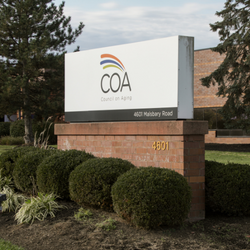
For the first time in the organization’s 50-year history, COA became a homeowner. In August 2021, COA moved its headquarters from Springdale to Blue Ash, in Hamilton County. COA’s phone numbers did not change, and we continue to operate an office in Wilmington (Clinton County). “Our building will allow us to host events, organize drives on-site, and other activities that we realized were deemed critical to meet the needs of seniors during the pandemic,” CEO Suzanne Burke told the Cincinnati Business Courier in an interview about the move. Read more.
Suzanne Burke Recognized as top CEO in the region

Council in Aging (COA) CEO, Suzanne Burke, was recently honored by the Cincinnati Business Courier with a C-Suite Award. Burke won in the Chief Executive Officer, Large Non-Profit Category.
In it’s seventh year, the C-Suite Awards honor top-level executives who’ve shown outstanding leadership and led stellar performance at Greater Cincinnati businesses and nonprofits.
The Courier announced the winners during a virtual awards ceremony September 2,
A special section in the Sept. 3 print edition of the Courier featured information about the C-Suite finalists and profiles of the winners. Click here to read Burke’s profile. In addition to her profile, Burke was one of only a handful of honorees featured in the paper’s Sept. 3 cover story, Cool Under Pressure. In the story, area CEOs discussed ways their companies adapted on the fly during the COVID-19 pandemic, and how they are carrying some of those adaptations forward.
As part of her C-Suite profile, Burke shared with the Courier the professional achievement that has given her the most satisfaction during her career. “The way our entire organization stepped up to help seniors, who were severely impacted, throughout the pandemic. In addition to our normal services, we distributed over 7,000 boxes of personal products, 15,600 shelf stable two-week meal boxes, and started a new comfort meal program. The comfort meal program has provided over 88,000 restaurant meals for seniors in low-income buildings. This program was a win-win as local restaurants were suffering from business loss due to COVID and they were able to be paid to provide special meals to our older adults who were also suffering.”
COA receives community champion award for vaccinating homebound older adults
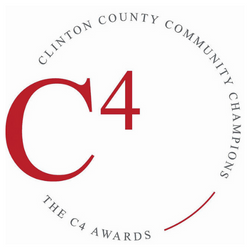
2023 Update: Due to the end of the COVID-19 pandemic, this program is no longer available. Vaccines may be available at private doctor offices, pharmacies, workplaces, community health clinics, health departments or other community locations, such as schools and religious centers. If your primary healthcare provider does not stock all the vaccines recommended for you, ask for a referral. You may also find locations providing the flu and COVID-19 vaccines in your community at www.vaccines.gov.
For the second year in a row, Council on Aging (COA) is the recipient of a Clinton County Community Champions (C4) Award. COA received the award for its leadership in developing a program to bring COVID-19 vaccinations to homebound old adults.
The 2021 Clinton County Community Champions Awards are presented by the Wilmington-Clinton County Chamber of Commerce — along with 2021 Premium Sponsor the Clinton County Convention and Visitors Bureau (CVB) — to highlight the stories of the Clinton County citizens, employers and employees, and organizations who are making an impact in the community. The awards will be presented at the Wilmington-Clinton County Chamber of Commerce’s Annual Meeting and C4 Awards Ceremony on Sept. 22 at the Roberts Centre.
Over 50 nominations were submitted for six categories: Business, Citizen, Education, Healthcare, Non-profit, and Youth.
Nominees exemplified one or more of the following, during the course of the current year:
- Exceptional commitment to our community by helping with a special project and/or ongoing activities
- Unselfish leadership, creativity, cooperation, and hard work in the service to others
- Inspiration to others as a role model
COA was recognized in the award program’s healthcare category.
Since January 2021, Council on Aging (COA), the Area Agency on Aging (AAA) for Clinton County and four other counites in southwestern Ohio, has been helping older adults get vaccinated against COVID-19. COA staff have helped older adults find and schedule vaccine appointments, and when necessary, provided transportation to those appointments.
As COA staff helped older adults navigate this process, another need quickly emerged: vaccinating individuals who could not leave their homes. The need was especially great in the more rural parts of COA’s service area, including Clinton County where more than 900 individuals receive in-home care through programs administered by COA.
“We’ve been helping older adults get vaccinated from day one,” said Ken Wilson, COA’s vice president of programs and business operations. “Right away, we started working to find a way to vaccinate older adults who could not leave their homes. Because COA provides in-home care services to homebound older adults, we were in a good position to identify who in the community needed this service.”
COA raised concerns at the state level about vaccinating homebound individuals, but it was clear there was no statewide plan to meet this urgent need. Many questioned whether homebound individuals needed to be vaccinated at all. In fact, homebound older adults and people with disabilities are just as vulnerable – if not more – than other older adults in the community.
- For many older individuals, leaving their home to get vaccinated could result in serious physical hardship or present a danger to their health.
- Many homebound individuals have multiple care providers coming and going from their homes on a daily basis, increasing their risk of exposure.
- Many homebound individuals have multiple chronic health conditions which put them at greater risk of contracting COVID-19 and of developing severe complications from the virus.
As the need grew, AAAs like Council on Aging were directed to work with local providers to identify ways to vaccinate the homebound population.
The challenge, Wilson said, was identifying a partner and developing the procedures to get the shots into arms. “In Clinton County, we found a willing and enthusiastic partner in Pam Bauer and her team at the Clinton County Health District.” Wilson added.
COA conducted research to determine how other states were tackling this issue and discovered that in neighboring Indiana, local Fire/EMS teams were conducting in-home vaccinations for homebound individuals in their respective jurisdictions.
COA modified this approach, leveraging the strong relationships it had built with local health departments during the pandemic, including the Clinton County Health District.
COA developed protocols and procedures to identify and track individuals who required in-home vaccinations. Eligible individuals were added to a tracking database that was shared weekly with the Clinton County Health District and other local health departments. The health departments then reached out to individuals on the list to schedule vaccination appointments. In many cases, unvaccinated caregivers and family members residing in the same home were also offered vaccinations.
“We have always addressed the homebound population for other vaccinations,” said Pamela Walker-Bauer, health commissioner for the Clinton County Health District. “It was helpful for COA to help us identify additional individuals beyond our more regular clients for the COVID vaccine. We appreciated the administrative support, and the [continued] weekly emails are great.”
For Clinton County resident and COA client, Susan, being able to get vaccinated in her home was a relief. The rural Martinsville resident has had several strokes and is paralyzed on the right side of her body, making it nearly impossible to leave her home.
“I’d been trying to get vaccinated since day one,” Susan said. “When they called me to schedule my appointment, I was so relieved.”
Susan’s Council on Aging care manager, Carla McCauley, ensured she was added to the homebound vaccination list. Then, staff at the Clinton County Health District followed up to schedule the vaccination.
Susan was nervous about getting a shot – and about having a stranger in her home. “The nurse did a beautiful job,” she said. “I felt comfortable. She talked to me for a few minutes before the shot which made me feel better.”
Another Clinton County resident and COA client, Shirley, had a similar experience. Shirley’s daughter, Lynn, had been looking into how to get her mom vaccinated when she had a stroke. While Shirley was recovering at home, COA care manager Carla McCauley contacted Lynn to let her know that Shirley had been placed on the homebound vaccination list.
“It was a great experience,” Lynn said. “My mom is in a wheelchair. She had just had a stroke and couldn’t go out. Coming to her was everything.”
COA continues to work with the Clinton County Health District, and other local health departments, to coordinate in-home vaccinations for those who need them. To date, more than 1,000 individuals have been referred to or identified by COA as needing an in-home vaccination, including 25 in Clinton County.
COA’s pandemic comfort meal program receives disaster preparedness innovation award
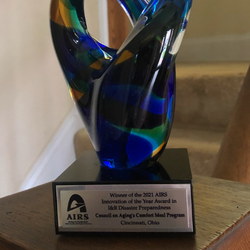
Council on Aging (COA) has received national recognition for an innovative program that addresses food insecurity and social isolation among older adults during the COVID-19 pandemic. In May, COA received an Alliance of Information and Referral Systems (AIRS) Innovation Award in the category of Disaster Preparedness for its COVID-19 Comfort Meal Program. COA has provided more than 84,000 meals to low-income older adults through this program since the start of the pandemic.
The AIRS awards recognize programs and organizations for innovation in five categories that align with the AIRS standards: Service Delivery, Resource Database, Cooperative Relationships, Disaster Preparedness and Operational Effectiveness. The Innovation Award, given to COA in the Disaster Preparedness category, recognizes COA’s comfort meal program and the important need it fills in the community.
During the COVID-19 pandemic, COA has provided meals that address not only food insecurity, but also the quality of life experienced by older adults during the pandemic. Because many older adults have been unable to leave their homes, they feel forgotten and isolated.
“We’ve learned from past emergency situations that food quickly becomes an urgent need for older adults,” said Council on Aging CEO, Suzanne Burke. “While food has been a focus for us during the pandemic, we also wanted to bring comfort to older adults and let them know they are not forgotten.”
To help ease the monotony felt by many older adults, COA sought out partnerships with local restaurants and service providers to deliver special meals to older adults – particularly low-income older adults isolated in senior apartment buildings in parts of COA’s service area.
“Most residents are scared because of COVID-19,” said a local apartment manager. “This is a wonderful treat for them.”
While the program’s primary focus is low-income older adults, the program also provided a boost to COA’s local economy at a critical time. The restaurant industry was hit hard by pandemic-related shutdowns and limitations to dine-in service. Meals purchased by COA helped restaurants keep their doors open – and their staff at work.
“This is an opportunity for us to bring some people back to work and keep the lights on at our commissary,” said a local restaurant owner. “But more importantly, it’s an opportunity to give back and be part of something good that’s happening in our community.”
COA’s Aging and Disability Resource Center (ADRC) staff are certified by AIRS, a professional credentialing organization for individuals working within the Information and Referral sector of human services. Annually, COA receives nearly 50,000 requests for information and referral via its call center and website.
More About COA’s Comfort Meal Program
COA’s comfort meal program is a community partnership. The meals are paid for by COA – via grants, donations and federal funds designated to expand meal service to older adults during the pandemic*. The program partners with ten local restaurants (five of them minority owned) including LaRosa’s Pizzerias, Frisch’s, Taste of Belgium, C&M BBQ Grille, Chef Anthony Jordan, La Soupe, Big Jay’s Place, Neal’s Famous BBQ, Beaugard’s Southern Bar B Que and Quatman Café. COA service providers collect the meals from participating restaurants and deliver them to low-income senior apartment buildings across COA’s service area. More than 84,000 meals have been delivered to the doors of older adults in need since the start of the comfort meal program in April 2020.
This is not the first time COA’s comfort meal program has been recognized. It received the Ohio Association of Area Agencies on Aging’s 2020 Outstanding AAA Partnership of the Year award, and a Clinton County Community Champions (C4) Award.
*Hamilton County CARES Act funds support COA’s Comfort Meal Program.
Comfort Meal program grows, wins awards during year two of pandemic
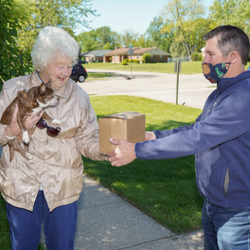
Council on Aging’s Comfort Meal Program, which began in April 2020 at the start of the pandemic, continues to have an impact on area older adults. In FY 2021, the program provided 62,908 meals through 10 restaurant partners. Since the start of the pandemic, the program has provided 123,559 meals.
When the COVID-19 pandemic began, COA heard from older adults who were afraid to go out for groceries and other necessities. They felt isolated, alone and forgotten. Others found themselves without their regular support network. Many who contacted COA had never before needed help.
Food security immediately became a focus for COA, with social isolation following close behind.
Council on Aging began searching for ways to bring comfort to older adults – particularly low-income older adults – who were stuck in the monotony created by the pandemic. The comfort meal program was born after local restaurant group, LaRosa’s Pizzeria, stepped in to provide meals to older adults in two low-income apartment buildings who’d been impacted by a multi-day power outage and pandemic-related lockdowns.
“We’ve learned from past emergency situations that food quickly becomes an urgent need for older adults,” said Council on Aging CEO, Suzanne Burke. “We partnered with area restaurants to not only help meet the nutritional needs of older adults during the pandemic, but to also help them feel connected to the outside world. Things may be returning to normal, but many older adults are still weary of being in crowds, and sadly, some have fallen out of touch with their social and support networks. We plan to continue this program for the foreseeable future, so older adults have time to adjust to life changes caused by the pandemic.”
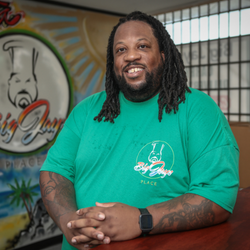
Today, COA’s comfort meal program includes ten area restaurants – five of them minority-owned. The restaurants include LaRosa’s, Taste of Belgium, Frisch’s, C&M BBQ Grille, Beaugard’s Southern Bar B Que, Quatman Café, Neal’s Famous BBQ, Big Jay’s Place, La Soupe and Chef Anthony Jordan.
While the program’s primary focus is feeding and bringing comfort to low-income older adults, the program also provided a boost to COA’s local economy at a critical time.
Matt Imm, owner of Quatman Café, said his restaurants have seen a boost because of the program. “People are coming in that might not have otherwise heard of Quatman,” he said. “It’s a win-win. The program has been great for business, and it’s a wonderful thing for the older adults. It’s like people helping people. That’s what we need right now.”
Marty Beaugard, owner of Beaugard’s Southern Bar B Que in Clinton County, has had a similar experience. “They are so appreciative,” he said of the older adults who receive his home-cooked meals. “One senior came in after sending me a card. She gave me a hug and told me how much she loved it. She told me when this is all over, she would eat at Beaugard’s more often.”
“We’ve had nothing but positive feedback from customers who have received the meals,” added Imm. “One gentleman came to the restaurant and actually brought the box the meal was delivered in. He signed the box with a personal thank you and wanted to hand it to me personally.”
COA’s comfort meal program is a community partnership. The meals are paid for by COA – via grants, donations and federal funds designated to expand meal service to older adults during the pandemic. COA service providers, including Meals on Wheels of Southwestern Ohio & Northern Kentucky (MOW), collect the meals from participating restaurants and deliver them to low-income senior apartment buildings across COA’s service area.
“The restaurants and providers have become quite a team,” said Burke. “The restaurants are a significant part of COA, and we are a significant part of their business. We’re all in it because we care.”
In 2020 and 2021, the comfort meal program received several local, state and national awards, including:
- Ohio Association of Area Agencies on Aging: Outstanding AAA Partnership of the Year (October 2020)
- Clinton County Community Champions Award: Non-Profit Category Winner for Comfort Meal Program (November 2020)
- Alliance of Information and Referral Systems (AIRS): Innovation Award, Disaster Preparedness Category, Comfort Meal Program (May 2021)
COA also received a $25,000 Bold Goal grant from Humana to help fund the comfort meal program. Bold Goal is a population health initiative focused on improving the health of the communities served by Humana. The grant funded monthly comfort meal deliveries at three low-income senior apartment buildings in COA’s service area for one year. Humana has renewed its Bold Goal grant with COA for 2022.
COA and the program’s restaurant partners have received countless phone calls, letters and cards from comfort meal recipients, all with a similar theme: Thank you for remembering us.
Forum on Aging returns in 2021, virtual style!
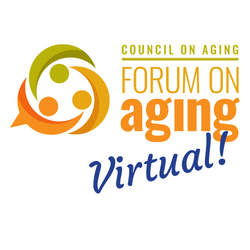
After the coronavirus forced COA to cancel the 2020 Forum on Aging the evening before the event was scheduled to start, Forum on Aging returned in 2021 in a virtual format. Nearly 250 people attended the conference, which occurred over two half days in April.
Attendees enjoyed presentations from eight professionals on topics related to aging, such as the effect of the pandemic on the health and well-being of older adults and the impact of physical, mental and social activity on cognitive aging.
As with the in-person event, those who attended were able to earn continuing education units. Attendees were also able to make virtual “visits” to the event sponsors.
While historically, one of the hallmarks of Forum on Aging has been the ability for professionals to connect in-person with others in the same field, those who attended the virtual event were enthusiastic about the format and the opportunity to learn.
COA honors area home health aides as 2021 heroes
Council on Aging (COA) is pleased to recognize three area home health aides as 2021 Home Health Aide Heroes: Deborah Grant (Clinton County Community Action Agency), Gwen Squire (A Miracle Home Care) and James Roe (Hillebrand Home Health). The honorees were selected from among nearly 100 area home health aides who were nominated in 2020 for COA’s Service in Excellence Award. Nominations were submitted throughout the year by COA staff, clients and family members. This year’s honorees reflect admirably on a workforce that is critical to meeting the care needs of a growing population – and that certainly deserves more respect.
Home health aides provide critical and often life-saving care for older adults who want to remain in their homes as they age. They provide very personal care – help with bathing, dressing and eating – as well as important everyday tasks like cleaning, cooking and running errands. Home health aides are in a position to get to know their care recipients intimately and can be the first to notice critical changes in physical and behavioral health.
But the stability home health aides provide is in jeopardy. Home health workers’ low wages, thin benefits, unpredictable schedules and other job challenges and stresses mean there is a shortage of qualified home health aides. As the economy has improved in recent years, many have left the industry for higher paying, more stable employment opportunities. Click here to read more.
Council on Aging CEO, Suzanne Burke, presented awards to each honoree at their place of employment. Additionally, the honorees were recognized on April 21 during Council on Aging’s virutal Forum on Aging conference. Conference attendees work for, with and on behalf of older adults and people with disabilities. They understand the important role home health aides play in helping their clients and patients remain independent at home. COA also presented a video highlighting the honorees and the role this critical workfoce plays in helping COA achieve its mission. The video also aired on WCPO, April 22.
Deborah Grant
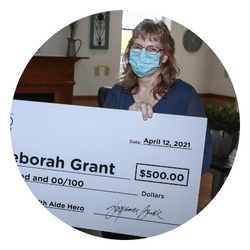
Ms. Grant was nominated by Clinton County Elderly Services Program (ESP) Care Coordinator, Carla McCauley, and Linda Rice, the sister of an ESP client. The nomination referenced the long-standing and life-saving care Ms. Grant provided to Ms. Rice’s sister, Sue.
The nomination stated that Ms. Rice appreciated the more than 10 years of care Ms. Grant provided for her sister. Ms. Rice said, “Debbie is invaluable for Sue. They have a long-standing, admirable friendship and know each other well. I don’t live with Sue, so I can’t always be there. Debbie is certainly someone to be counted on. So much so, that Debbie saved my sister’s life.”
Ms. Rice shared that during an appointment in 2020, Ms. Grant arrived at her sister’s home for her scheduled appointment but got no answer at the door. Instead of leaving, Ms. Grant entered the open apartment and found Sue in her bedroom – unresponsive and in trouble. Ms. Grant called 911, likely saving Sue’s life.
Ms. Rice said, “I don’t know if Sue would have made it if Debbie hadn’t gone to the apartment when she did. I can’t say enough about my sister’s services! Thank you for everything you do.”
Click here to read more about how Ms. Grant’s care impacted Sue – and Ms. Rice’s – life.
Ms. Grant received a $500 prize from Counci on Aging.
Gwen Squire
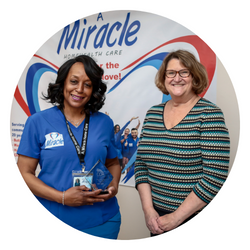
Ms. Squire was nominated by Council on Aging Care Coordinator, Joan Long. In many cases, the care provided by a home health aide benefits not only the older adult, but also the family members who are also providing care to their loved one.
Here’s what Ms. Long had to say about the care Ms. Squire provided for a couple grappling with the effects of Alzheimer’s Disease:
Gwen has been caring for our client for the past year, who has Alzheimer’s Disease. Gwen’s help is essential for our client – and her husband – to remain in their home. Gwen provides respite (time off) for the husband, who serves as our client’s primary caregiver. Gwen provides personal care; cleans the client’s bedroom and bathroom; and provides learning time. The client’s husband described Gwen as: super, kind, loving, caring, patient, dependable, and part of our family. He said, “We are able to stay at home because of Gwen’s help.
Ms. Squire received a $250 prize from Council on Aging.
James Roe
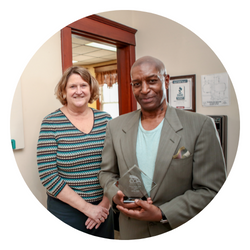
Home health aides are often required to provide complicated and physically demanding care. James Roe is the type of aide who is willing to do whatever it takes to make sure his clients are comfortable and safe. Mr. Roe was nominated by Council on Aging Care Coordinator, Cheryl Porter.
Here’s what Ms. Porter had to say about the care Mr. Roe provided for a particular COA client:
On behalf of Council on Aging, my client and the client’s family, I wish to recognize James Roe from Hillebrand Home Health for exemplary home health care service. James surpassed all expectations in providing skilled and compassionate care, always making sure that the client was clean, comfortable and safe. James was trusted by the client in assisting with difficult transfers in/out of bed. James deftly used the Hoyer lift and other techniques to reduce the client’s pain and discomfort. James’ skills, exceptional care and willingness to work extra shifts shows his extraordinary commitment in caring for others. Thank you for all that you do!
Mr. Roe received a $250 prize from Council on Aging.
Home health aides recognized through Service Excellence Award program
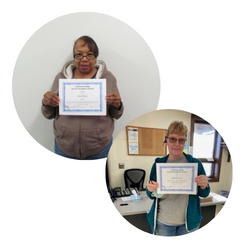
Home health aides play a critical role in our country’s long-term care system. They provide very personal and often life-saving care for older adults who want to remain in their homes as they age. And, they provide much needed support for family caregivers who are struggling to balance other responsibilities including careers and raising young families.
But the stability home health aides provide is in jeopardy. Home health workers’ low wages, thin benefits, unpredictable schedules and other job challenges and stresses mean there is a shortage of qualified aides. As the economy has improved in recent years, many have left the industry for higher paying, more stable employment opportunities.
In recent years, Council on Aging (COA) has done a number of things to lessen the impact of the home health aide shortage on older adults in our region.
Additionally, in 2019, COA created the Service Excellence Awards to call attention to the important role the workforce plays in helping COA fulfill its mission. COA has recognized more than 110 local home health aides through this program.
Nominating a hard-working aide has never been easier. A simple nomination form and information are available here. Through this form, COA staff and service providers, members of the community, as well as COA clients, their family members and friends, can nominate a home health aide who works for one of COA’s contracted service providers.
“These awards are a reminder to this critical workforce that their efforts really do make a difference in the day-to-day lives of their clients,” said CEO Suzanne Burke.
Nominations are accepted throughout the year. Each nominee receives a Service Excellence Award certificate from Council on Aging. All Service Excellence Award nominations will be reviewed and considered for the Home Health Aide Hero Award, to be presented at Forum on Aging in March 2022. Up to three (3) Hero awards will be given each year. The Hero award includes a personalized award as well as a cash prize.
COA and volunteers prepare 7,600 personal care supply boxes for area older adults
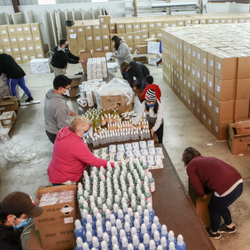
Question: What do 30,000 rolls of toilet paper, 22,500 tubes of toothpaste and 7,600 bottles of hand sanitizer have in common?
Answer: These – and thousands more personal care and cleaning items – were included in more than 7,600 boxes recently assembled and distributed to Council on Aging clients (COA). More than 120 volunteers from COA, our network of service providers and members of the community contributed to the effort.
During the COVID-19 pandemic, many of our clients have been stuck at home, afraid to venture out to shop for groceries, which includes not just food, but personal care and cleaning items. And at times, items such as toilet paper, antibacterial wipes and hand sanitizer were not even available to purchase because manufacturers and supply chains couldn’t keep up with demand.
Through various efforts – including its award-winning Comfort Meal program – COA has made it a priority during the pandemic to ensure vulnerable seniors in our area have access to food. But also important is the ability for seniors to keep themselves and their environments clean and safe.
Early pandemic partnerships between COA, local churches and Frame USA’s Fill the Truck charity yielded hundreds of care packages of personal care and cleaning items distributed to those who contacted COA for help. At the time however, these products were in such high demand that it became difficult to procure enough for all the older adults in our area who needed supplies.
CARES Act funding received by COA months later – along with leveled off demand for the items among the general public – made it possible for COA to source the box contents and move ahead with the project in August. After hundreds of volunteer hours and several months, the last of the boxes shipped to clients during the first week of 2021.
In addition to the toilet paper, toothpaste and hand sanitizer, each box also contained disinfectant, dish detergent, laundry detergent, paper towels, soap, facial tissues and disinfectant wipes. Receiving a box full of these items is a big deal when you have limited financial resources – and when you’re following public health guidelines to stay at home.
“These items mean the world to so many of our clients,” said COA CEO Suzanne Burke. “Sometimes they have to make the choice between these items and a meal.” The project was a major undertaking that required a large physical space at the Butler County Fairgrounds, and 84 industrial-size rolls of bubble wrap to bring to fruition.
The items in the boxes serve a practical purpose, but they’ve also provided a big psychological boost to older adults who’ve been disproportionately impacted by the pandemic. They appreciate they haven’t been forgotten during this difficult time. One client, upon receiving COA’s letter alerting her the box would arrive soon, said, “You get to the age of 80 years old, and all your family’s gone, and not many friends left, it’s just good to know that somebody’s got your back, and it gives you hope, and it lifts your spirit.”
COA helps older adults get COVID-19 vaccinations
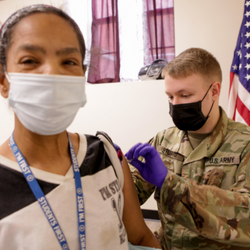
Since February 2021, Council on Aging has played a key role in helping older adults in our region get vaccinated against COVID-19.
When Ohio rolled out its statewide COVID-19 vaccination plan in February 2021, older adults were among the first eligible groups to receive a vaccination. However, older adults had difficulty getting vaccinated for two primary reasons: 1) there was not enough vaccine to meet the demand; and 2) most vaccine registration systems required use of a computer or smart phone to make an appointment – a barrier for many older adults. There was also confusion about where older adults could go for assistance in navigating a fragmented vaccine system.
COA helped older adults overcome these barriers by:
- Helping older adults find vaccine providers in their community. COA staff monitored local vaccine availability and helped older adults schedule appointments or join applicable waiting lists.
- Providing no-cost, roundtrip transportation to vaccination appointments for eligible older adults.
- Assisting the Ohio National Guard with vaccination clinics at low-income senior apartment buildings in the region, including coordinating busing from nearby senior communities to maximize the number of people vaccinated at each clinic. Governor Mike DeWine and First Lady Fran DeWine attended one of these clinics and praised Area Agencies on Aging for their work in helping older adults through the pandemic.
“This is the first time COA has worked with the National Guard to vaccinate older adults in this way,” said Ken Wilson, COA’s vice president of program operations and business services and a lead coordinator for the vaccination clinics. “There was a lot of coordination and planning that went into these clinics. It was great to see everyone working together with one goal in mind: protecting vulnerable older adults from COVID-19.”
Residents who came for vaccine appointments showed a range of emotions. Some were apprehensive about getting a new vaccine, but recognized it was their best option for getting their lives back to normal.
“I never get the flu shot,” a resident at St. Francis Court said, “but I thought this was important.”
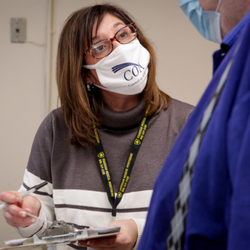
In March 2021, COA began working with local health departments to vaccinate homebound older adults. For many older individuals, leaving their home to get vaccinated could result in serious physical hardship or present a danger to their health. As a result, COA advocated at the state and local level for a process to vaccinate homebound older adults.
“We’d been helping older adults get vaccinated since Ohio’s vaccination plan went into effect,” said Ken Wilson, COA’s vice president of program operations. “From the beginning, we worked to find a way to vaccinate older adults who could not leave their homes. Because COA provides in-home care services to homebound older adults in southwestern Ohio, we were in a good position to identify who in the community needed this service.”
COA worked with local health departments to develop a plan to vaccinate homebound older adults. Using the Centers for Disease Control and Prevention’s (CDC) guidelines for vaccinating homebound individuals and a locally-developed screening tool, COA built a list of individuals who qualify for in-home vaccination in southwestern Ohio. The list included COA clients, as well as individuals from the community who are not enrolled in a COA program. COA initially partnered with United Way of Greater Cincinnati to help identify eligible individuals. Community members could also call COA to see if they qualify.
On a weekly basis, COA provided local health departments with a list of homebound individuals in their jurisdiction. Health departments then contacted these individuals to schedule their appointment. This work continues as older adults continue to get vaccinated against COVID-19.
“Some people think because they’re homebound, they’re not high-risk, but it’s actually quite the opposite,” Wilson said. “Most homebound individuals have two or more health conditions which put them at risk for severe complications, hospitalization or even death from COVID-19. And, these individuals have people who are coming and going from their home – caregivers, home health care and others – which can increase their risk of exposure.”
COA’s efforts to help older adults get vaccinated against COVID-19 continue. A major focus at the time of this writing is booster shots. Booster shots are important because the vaccine’s effectiveness at preventing serious illness lessens over time – especially in people age 65 and older.
Links to more reading:
- COA, National Guard partner on vaccination clinics in low income senior buildings
- COA helps older adults access COVID-19 vaccine
- Town Halls to prepare buildings for vaccination clinics
- Homebound vaccination program
Senior farmers’ market program nearly doubles participants in 2021
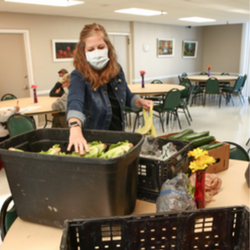
In its second year operating in southwestern Ohio, the United States Department of Agriculture Senior Farmers’ Market Nutrition Program (SFMNP) nearly doubled in size, providing 2,122 low-income area older adults with fresh, local produce for no out-of-pocket cost.
Working with community members and the Ohio Department of Aging, Council on Aging (COA) brought the program to its service area for the first time ever in 2020. Despite the challenges and uncertainty posed by the early months of the COVID pandemic, more than 1,100 people joined the program in its first year.
Many factors contributed to the program’s growth in in 2021:
- many older adults were vaccinated and more comfortable leaving their homes
- more farmers’ markets were open due to less restrictive business-closure ordinances
- COA staff were able to promote the program at in-person events and through other outreach activities
“I heard from older adults that they were not only thankful to have healthy, delicious produce to eat without affecting their food budget, but they were also excited to get out of their homes and interact with others at the markets,” said Jennifer Lake, COA’s Provider Services Supervisor and Nutrition Business Relations Partner. Lake was instrumental in bringing the program to the area.
Through the traditional program, each participant receives $50 in coupons to redeem for locally grown produce, herbs and honey at participating farmers’ markets and roadside produce stands.
The aim of the program is not only to help low-income older adults, but to support local farmers. “Older adults had more places to redeem their coupons in 2021, because we almost doubled the number of locations that participated during 2021,” Lake said. “We’ve built some strong partnerships with local farmers through the program.”
Through some of these partnerships, hundreds of older adults did not even have to leave their homes to receive their fruits and vegetables. For the 2021 growing season, Lake made permanent a pilot program from 2020, where Community Supported Agriculture (CSA) farmers delivered their bounty directly to low-income senior apartment buildings in Hamilton and Butler counties. The number of buildings receiving these deliveries doubled from three in 2020 to six in 2021.
